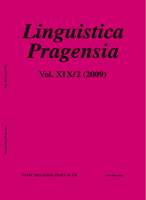Cenni sulla complementarità dei suffissi -tore/-nte in Italiano antico
Some Remarks on the Complementarity of the Suffixes -tore/-ante in Old Italian
Author(s): Pavel ŠtichauerSubject(s): Language and Literature Studies
Published by: AV ČR - Akademie věd České republiky - Ústav pro jazyk český
Keywords: Derivational Morphology; Old Italian; Present-day Italian; Complementarity of the suffixes -tore/-ante
Summary/Abstract: The article analyzes, in a diachronic perspective, the complementarity of two rival Italian suffixes -tore/-ante. It is shown how the selection of one or the other suffix is dependent on the semantic instruction of these suffixes. The different semantics is exemplified with two main couples parlatore/parlante and occupatore/occupante. It is assumed that the stronger agentive meaning tied up with -tore can also be seen in some texts of Old Italian. As an example, one couple – abitatore/abitante – nonexistent in present-day Italian, is presented and it is shown how these two formations display different meanings in Villani's Cronica. In fact, abitatore, in Villani's language, is always modified by the adjective primo 'first' which points to a stronger, active meaning corresponding roughly to settler more than to a passive inhabitant.
Journal: Linguistica Pragensia
- Issue Year: 2009
- Issue No: 2
- Page Range: 75-81
- Page Count: 7
- Language: Italian

